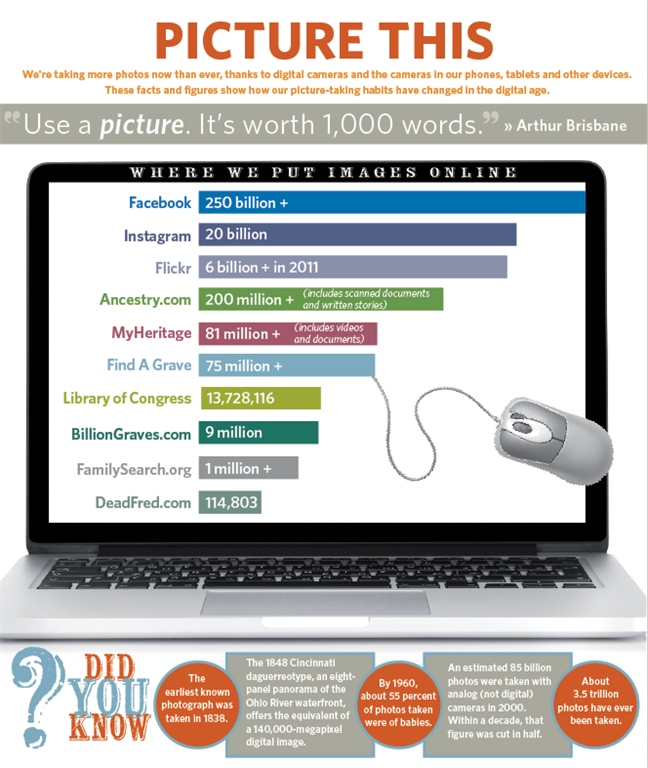Sign up for the Family Tree Newsletter Plus, you’ll receive our 10 Essential Genealogy Research Forms PDF as a special thank you!
Get Your Free Genealogy Forms
"*" indicates required fields
The internet has transformed genealogy from a hobby for the comfortably retired to one that better accommodates the budget, schedules and online culture of the young. Simultaneously, the search for identity has become a major theme in today’s cultural discourse. People of all ages and backgrounds want to know more about their roots. Entire television series, including TLC’s “Who Do You Think You Are?” and PBS’ “Genealogy Roadshow,” are based on this quest.
• The National Genealogical Society (NGS) annual conference has organized a Saturday Kids’ Camp for the past five years. NGS also offers the yearly Rubincam Youth Award to middle or high school students. And for the first time in 2013, NGS offered a youth rate for attendance at its conference.
• The Association of Professional Genealogists (APG) recently added a youth membership option. Those under age 25 can join for $50 a year, half the rate of professional members. APG also offered a scholarship this year for professionals age 18 to 29 to attend the APG Professional Management Conference in January 2015.
• The 2015 RootsTech conference in Salt Lake City offers a student pass for $39. A free Family Discovery Day on Saturday targets Latter-day Saint (Mormon) youth.
• The annual Suzanne Winsor Freeman Student Genealogy Grant, from Family Curator blogger Denise Levenick and the Southern California Genealogical Society, includes a $500 cash prize and registration at the Southern California Genealogy Jamboree. Meet this year’s winner, Paul Woodbury, on the opposite page.
• Other state and regional societies are experimenting with offerings such as the Ohio Genealogical Society’s junior genealogists’ event during its 2014 conference. The Western Reserve Historical Society in Cleveland sponsors a youth family history writing contest.
These organizations communicate their events via apps, blogs, Twitter, Facebook and other social media—places where younger audiences are watching, reading and listening.
Organizations with a wider focus on history—not necessarily family history—reach out to the young, in admittedly more fun ways. Living history attractions (such as Colonial Williamsburg, Va., and Connor Prairie, Ind.) let you sit in a colonial living room, feel the heat of a blacksmith’s shop and sample bustle oven-baked bread. This type of sensory experience fed my imagination as I began to learn how my ancestors lived. Two such programs available for young people include:
• Journey through Hallowed Ground hosts service learning projects and “Extreme Journey Camps” for middle schoolers. In the former, students visit a historic destination and produce minimovies about the heritage they encounter. The Extreme Journey experience recreates an intelligence mission during which young “agents” follow in the footsteps of historic leaders.
• The National Archives holds sleepovers for kids ages 8 to 12, incorporating history lessons through music, games and visits from re-enactors. For a recent event, kids unrolled their sleeping bags in the Rotunda and breakfasted on pancakes served by the Archivist of the United States.
» Martina Paetzel, Columbus, Ohio
» Melina Kline, Youngstown, Ohio
» Jana Sloan Broglin, Swanton, Ohio
5 Questions with Paul Woodbury
When I was in elementary school, I drew the flags [of foreign nations] in my free time and memorized the capital cities of every country. I received a family history binder from my grandparents. The pedigree chart showed my family in Norway, Sweden, Denmark, Germany, France, England and the Isle of Man. Suddenly I had a personal connection to those cultures and places.
2. What turned this interest into a career-worthy passion?
I saw a television series when I was 13 that investigated the family history of African-American celebrities through traditional research and genetic analysis. I decided then that I wanted to pursue a career in genetic genealogy.
I think it’s a widespread impression, but that it doesn’t have to be. While many may not consider themselves family historians, most people are interested in their own family history. It influences and impacts their own personal story.
4. What advice do you have for helping young people to enjoy genealogy?
Help them connect it to their current interests. If they enjoy science, invite them to take a DNA test. Be willing to help and allow them to help you. Be patient and encouraging. Encourage them to share their discoveries [with family], online and on social media.
DNAGedcom.com. This website and tool is helpful for sorting through genetic cousins and limiting [yourself] to the most informative DNA matches. It helps you to visualize which segments of DNA you received from which ancestors, and triangulate data to determine matches.

ADVERTISEMENT
